What could Nashville transit look like? New North Nashville center offers glimpse
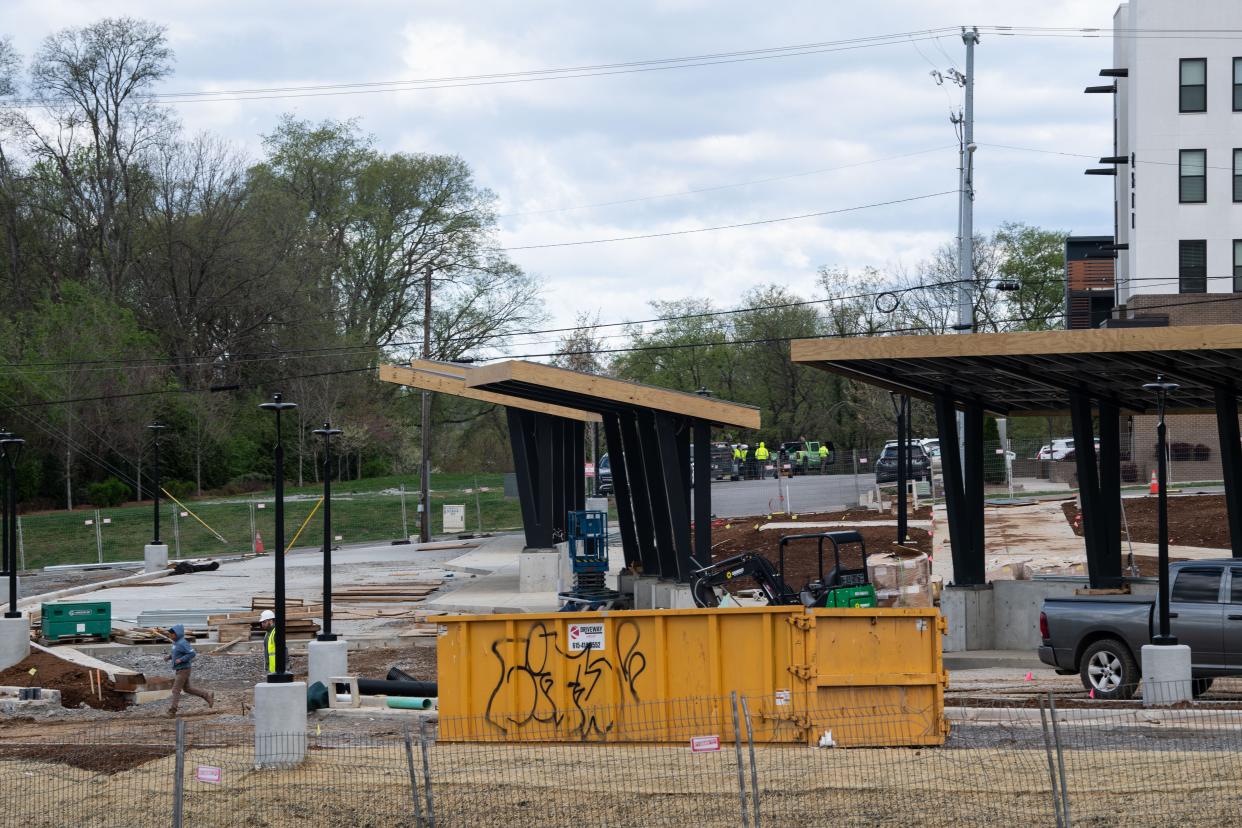
Terrence Vaughn uses the bus to get to work and school, to get home, and to pick up his son. Until recently, "it was horrible," he said. There weren't enough stops, and they weren't conveniently located. But now, the bus goes up the street past his Buena Vista Pike apartment and stops near his son's school.
On a blustery Friday afternoon in April, he waited at a temporary bus stop on Clarksville Highway. Across the street, a new North Nashville transit center is taking shape behind a chain-link fence. It will be open by June, providing a hub for seven WeGo bus lines and a climate-controlled waiting area.
For Vaughn, who has lived in Nashville for all of his 35 years, having a new transit center along his daily commute is good news. But the route and service changes that rolled out in March are even better.
"Everywhere I need to commute to, they go," Vaughn said.
As Vaughn boarded his bus — 71 Trinity, a brand new line that links East and North Nashville with no downtown detour — a woman stepped off, pushing a toddler in a stroller with four other children in tow.
The soon-to-be-finished center is frequently highlighted by city officials as an example of what Nashville's future in transit could be: a network of neighborhood transit centers of varying sizes with frequent, reliable bus service and crosstown routes that don't require riders to pass through downtown.
That idea is a major feature of Mayor Freddie O'Connell's "Choose How You Move" transit improvement plan, which could fund 12 new transit centers throughout Davidson County, bus service improvements, 86 miles of new sidewalks and upgrades to around 600 traffic signals, according to early drafts.
O'Connell will present the plan's final details on Friday at the Southeast Community Center in Antioch, part of the Global Mall property Metro purchased in 2022. The site is in the planning phase to become a regional transit center, and has gathered $20 million in state and federal grant funding to date.
He and his administration have presented the package — which notably lacks light rail — as a "common sense" approach that will use revenue from a new half-cent local sales tax increase to accelerate the delivery of projects Nashvillians have sought for years. Voters will decide if the transit benefits are worth the cost on Nov. 5.
O'Connell stopped short of identifying the new North Nashville Transit Center as the "proof of concept" called for by critics of past transit program attempts. The center, named after Nashville Civil Rights activist Dr. Ernest Rip Patton Jr., is Nashville's third. The Elizabeth Duff Transit Center at WeGo Central was the city's first, followed by a smaller neighborhood transit center completed at Hillsboro High School in spring 2022.
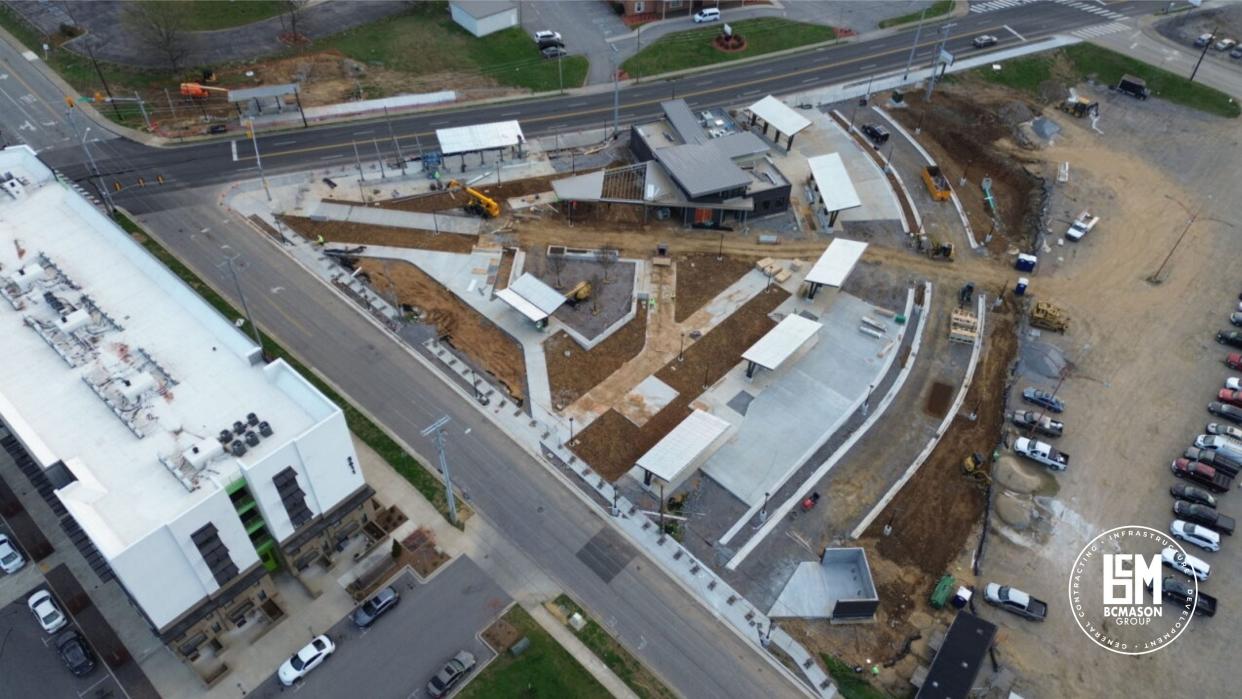
The North Nashville Transit Center cost $17 million, with 46% paid with federal dollars, 32% with state contributions and the remaining 22% by Metro. O'Connell says a dedicated local funding source would increase Nashville's competitiveness for future federal transit grants.
"I think we've already proven the concept," O'Connell said, "But this is an indicator of how much we can do that fits in this framework if the (transit) program is approved."
And if it's not?
"You'd be lucky to see a two-a-decade pace (for new transit centers) going forward," he said.
Where a 30-minute ride can take you
The North Nashville Transit Center broke ground in November 2022, but WeGo's service development staff started dreaming up plans for the new hub with the advent of the nMotion plan in 2016. WeGo CEO Steve Bland asked the staff where they would choose to construct the first neighborhood transit center. Their answer: "North Nashville, because there's a concentration of ridership, a concentration of disadvantaged populations (and) we already had a lot of intersecting service," Bland said.
This spring's service changes ahead of the new hub's opening expanded accessibility to essential needs and services, according to data models used by WeGo to estimate the impacts of service changes.
North Nashville Transit Center Commutes by USA TODAY Network on Scribd
Riders can now reach around 10 additional food pantries and five additional grocery stores within 30 minutes of the new center, according to the models. In the same 30-minute window, riders can now access two universities, four middle schools, two high schools and at least six medical centers.
And the changes greatly increase access to jobs: More than 64,400 jobs can be reached within a 30-minute ride from the new center during a commute between 7 a.m. and 9 a.m., compared to about 13,500 jobs accessible under the previous bus service.
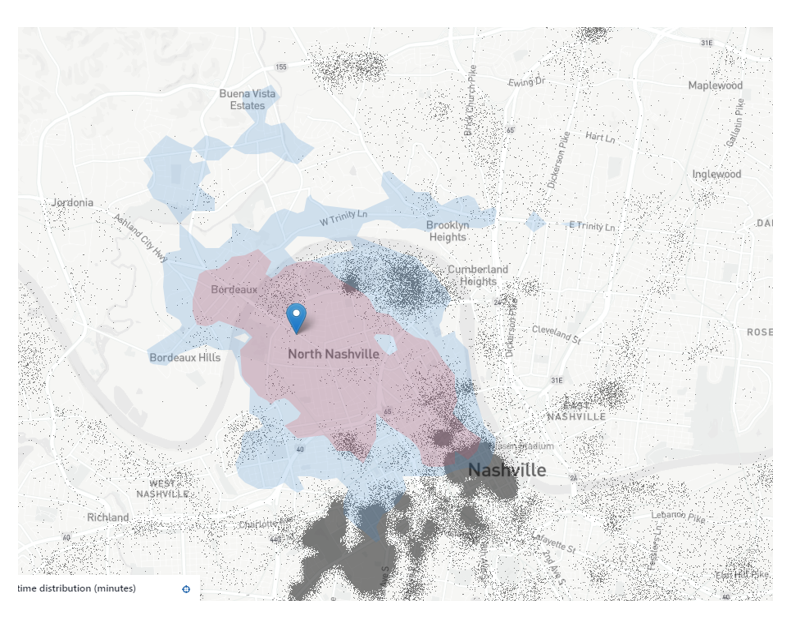
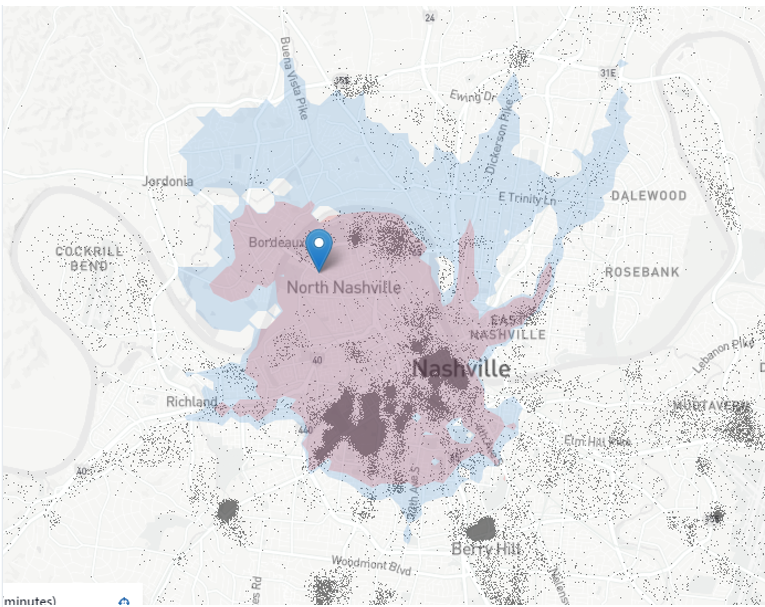
WeGo also expanded its WeGo Link program, which partners with Uber and other ride-share providers to offer subsidized fare to certain bus stops for riders in less-dense areas of the county. A new zone expands the program's service to Bordeaux and Haynes Park, with transfer points at the North Nashville Transit Center, the Clarksville Pike Kroger and the intersection of Trinity Lane and Whites Creek Pike.
Breaking transportation barriers
Staff at the nearby McGruder Family Resource Center on 25th Avenue North have high hopes for the new transit hub.
The center offers a food pantry, financial assistance, a program supporting families and workforce development programs, to name a few services. They'd like to offer more programs, but transportation is often a barrier for their clients.
Program Manager Nicole Bailey said in her experience as a case manager at the center, her clients' limited transportation options impacted what jobs they could apply for and what schools or after-school activities their children could attend. "A lot of my clients were taking jobs that were in walking distance, even if the wage wasn't sufficient to meet their needs," Bailey said.
It can be difficult to manage without a car in a city that is car-centric.
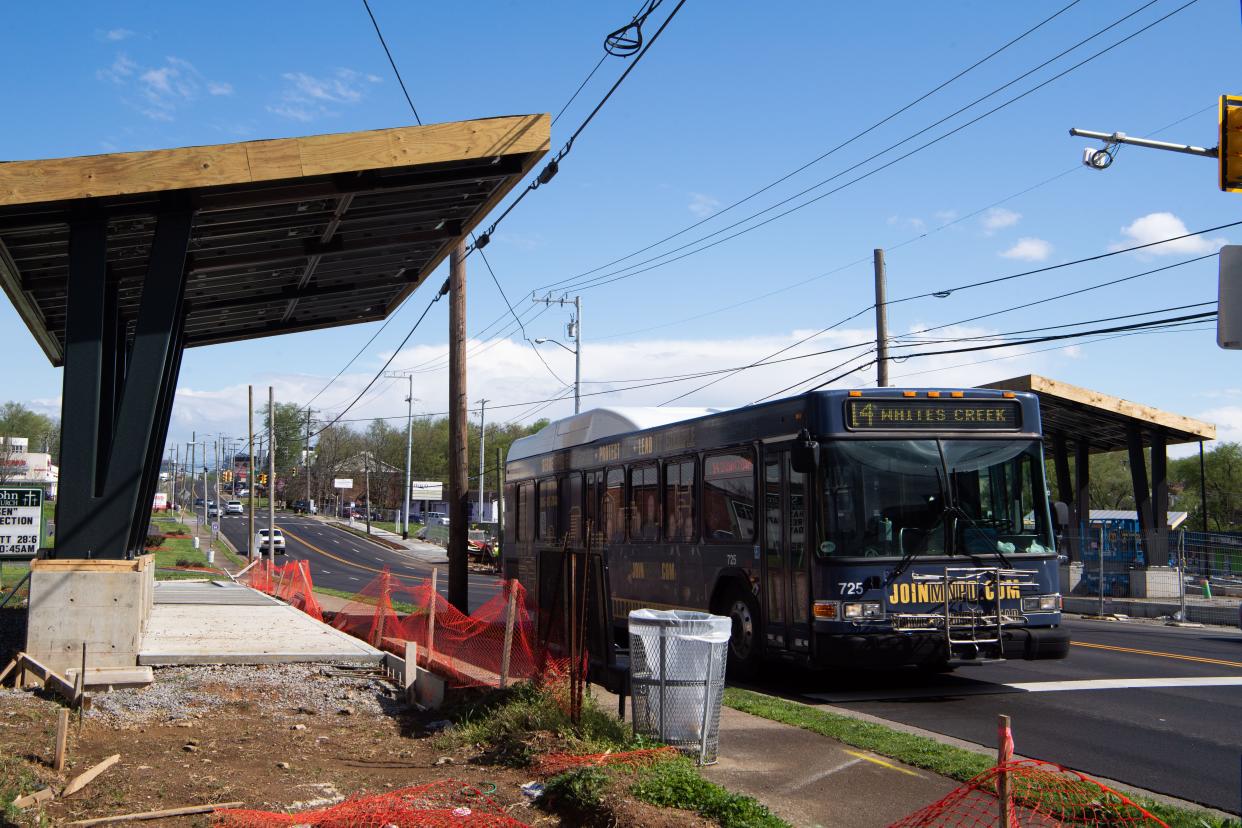
"We're talking about job opportunities and other things, but just think about the stress factor of having to navigate a bus system that may not be convenient for you, and all the different impacts that it has on your life ... then you've got stressed parents, and you've got stressed kids," Bailey said.
But accessible transportation can help, and a nearby transit center — importantly, one that offers a place to wait out of the elements and with WiFi — could allow more people to reach the McGruder Center and participate in its programs and community events.
Donna Burks does client intake for the center and said she found the previous bus service "frustrating" when her car broke down. Bus stops were sometimes a long walk away on busy streets with inconsistent sidewalks, or bus routes required inconvenient transfers. Her father was a bus driver in Detroit, and she said she's hopeful that Nashville's changes will be successful but she's reserving her opinions until she can see how they work in practice.
Work on the transit center will be augmented by other projects, including improved sidewalks and crossings to the McGruder Center and along Clarksville Pike and 25th Avenue North, Bland said.
Jaqueline Gordon works alongside Burks in intake, handling Metro Schools programs and housing. She's already given the changes a "thumbs up," particularly the addition of crosstown routes that reduce the need for time-consuming transfers. Her mother rides the bus to her job at Tennessee State University, and Gordon has seen effective bus systems in visits to Memphis and Las Vegas, she said.
Ideally, Burks and Gordon agreed, there would be a bus stop directly in front of the McGruder Center. The nearest stop is about a 5-minute walk away, but if someone has mobility issues or must carry a food pantry box or apprenticeship supplies, the short trip becomes more onerous.
Bailey is hopeful the transit center will also help spread the word about services offered at the McGruder Center. "That's a nice hub for that communication to take place, for the community to be able to inform each other," she said.
'A place for people'
The North Nashville Transit Center sits on a parcel carved from property owned by developer D.J. Wootson.
Wootson, co-owner of Titus Young Real Estate, began his work in North Nashville nearly 10 years ago with a mixed-use project called 1821 Jefferson. He said his goal is to "revitalize North Nashville" around the vibrant college communities of TSU, Fisk University and Meharry Medical College. He's considering developing 200 to 300 apartments and retail space on the site that now adjoins the new transit center.
"It makes it easier to do things like mixed-use developments and bringing in retailers and having interest in the site, people wanting to come there and live there and be there," Wootson said.
Bland has a similar community vision. It takes time for riders to discover and adjust to new routes, he said, but some benefits could reach beyond bus ridership. The center will feature historical displays on North Nashville figures and the Civil Rights Movement, in addition to artwork from local artists.
"We would love to see it not just as a place for people to change buses, but a place for people to hang out ... and play chess, look at the historical markers, enjoy the art," Bland said. "Ideally, we'd love to see food trucks popping up out there and all sorts of other activity."
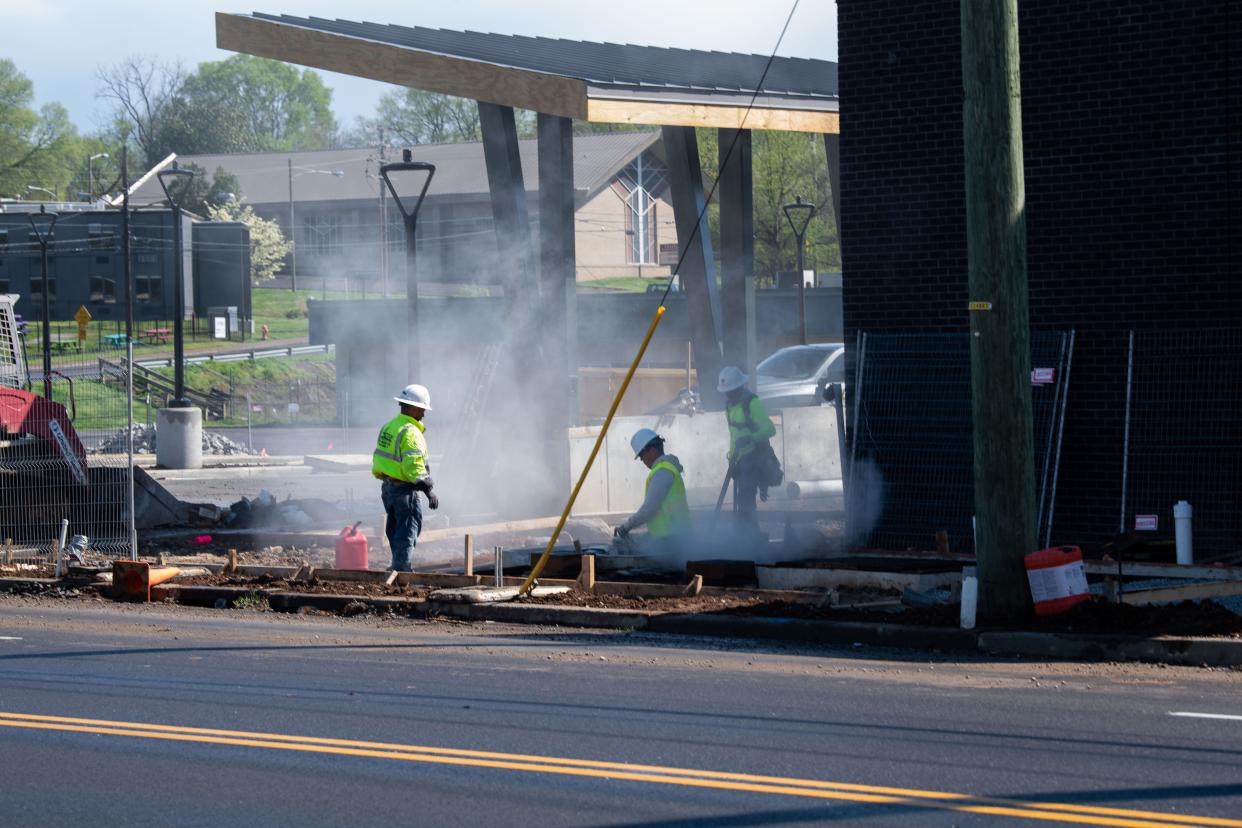
North Nashville Transit Center at a glance
Name: Dr. Ernest Rip Patton Jr. North Nashville Transit Center, after the Civil Rights activist and member of the Nashville Freedom Riders.
Location: 26th Avenue North and Clarksville Pike
Groundbreaking: Nov. 10, 2022
Ribbon cutting celebration: June 2024
Cost: $17 million (46% federal, 32% state, 22% Metro funds)
Features:
Nine bus bays
Areas for ride-share and taxi pickup/drop-off
Climate-controlled waiting area
Public restrooms
QuickTicket vending machines
Real-time transit information
Wi-Fi access
Accommodations for bike share, bike storage and scooters
Video cameras and emergency call boxes
Community plaza space
Art and historical displays
Bus routes serviced:
9 Metro Center
14 Whites Creek
22 Bordeaux
42 St. Cecilia/Cumberland
71 Trinity
75 Midtown
77 Thompson/Wedgewood
This article originally appeared on Nashville Tennessean: Nashville mayor Freddie O'Connell touts transit choice with new center
